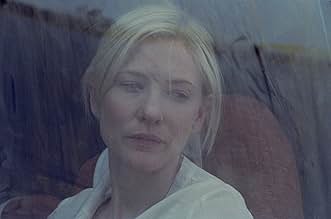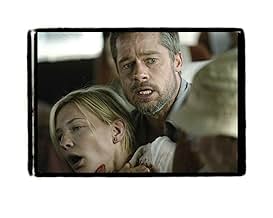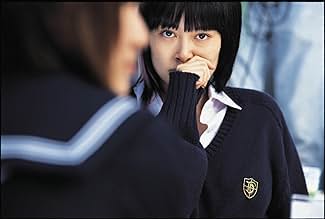Babel
- 2006
- Tous publics
- 2h 23m
Tragedy strikes a married couple on vacation in the Moroccan desert, which jump starts an interlocking story involving four different families.Tragedy strikes a married couple on vacation in the Moroccan desert, which jump starts an interlocking story involving four different families.Tragedy strikes a married couple on vacation in the Moroccan desert, which jump starts an interlocking story involving four different families.
- Won 1 Oscar
- 45 wins & 137 nominations total
Featured reviews
Alejandro Gonzalez Inarritu's Babel weaves four disparate and seemingly unrelated tales into a distinct, gritty narrative about the importance of communication - and what can happen when it goes awry. The movie is oftentimes difficult to watch, with ultrarealistic cinematography and gutsy, honest performances from its entire cast, particularly Oscar-nominated actresses Adriana Barraza (Amelia) and Rinko Kikuchi (Chieko).
Told nonlinearly, the movie describes the travails of a troubled married couple with a tour group in Morocco, played by Brad Pitt and Cate Blanchett. Something in their past has driven them apart, and to help deal with the problem they have taken a trip together. Meanwhile, the sons of a shepherd fight over who's the better shot with their new rifle and fire a blast at the couple's tour bus, critically wounding Susan (Blanchett).
Richard (Pitt) calls home in San Diego to notify the nanny of their children, Amelia; Amelia is in a bit of a bind, because she expected the parents home so she could attend the wedding of her son in Mexico. With Richard and Susan not returning soon, and with no one else available to watch the children, she takes them with her to the wedding.
In Japan, a deaf-mute Japanese girl acts out in reaction to her mother's suicide, which she discovered; the virginal Chieko becomes a huge sexual flirt, even removing her panties in a crowded restaurant to flash older boys. Chieko craves human contact but feels that the world's even more shut off to her now than ever before, and she sullenly shuns even her father's attentions.
It should go without saying that this film really isn't for everyone. It's gut-wrenchingly tough to watch at times, especially when Susan's wound is being treated. You can readily imagine how it'd be if you, an unworldly American, were suddenly in dire need of expert medical attention in a part of the world that wasn't really famed for it. That's enough to strike terror in me already, and I haven't even mentioned how Richard and Susan are awaiting help to arrive in a small, impoverished village with no running water or electricity - and only one person who can speak English to them.
How exactly these stories are commingled becomes evident as the movie progresses, but it's not all elegantly laid out for the viewer to immediately grasp; this is accomplished in part by the nonlinear storytelling. We see a scene near the end of the movie that is a mirror image of one from the beginning, except told from a different character's perspective. That's a tribute to the wonderful camera-work and editing by, respectively, Rodrigo Prieto and the team of Douglas Crise and Stephen Mirrone.
Barraza turns in a powerful, heart-breaking performance; at one point, she's stranded in the middle of the Sonoran desert with her two young charges clad in her dress from the wedding. Dazed by the blistering heat, Amelia cannot gain her bearings in the blazing heat, and she despairs. Then she makes a critical decision with devastating consequences.
Kikuchi is absolutely mesmerizing as the silent Chieko. Without uttering one word, she's able to convey a vast array of emotions, from loneliness to hostility to love to lust to affection. She's alternately serene and violent, in charge of and captured by her impediment. Chieko resents her father, her volleyball teammates, and most of all every so-called normal person who looks at deaf-mutes as monsters, creatures to be scorned and taken advantage of. Like Barraza, Kikuchi's role called for a difficult sacrifice: plenty of nudity.
Babel is a spellbinding, multifaceted story with towering, passionate performances by all of the leads. It's full of moxie and stark realism, and despite some minor plot implausibilities, it's a true feather in the cap for Inarritu.
Told nonlinearly, the movie describes the travails of a troubled married couple with a tour group in Morocco, played by Brad Pitt and Cate Blanchett. Something in their past has driven them apart, and to help deal with the problem they have taken a trip together. Meanwhile, the sons of a shepherd fight over who's the better shot with their new rifle and fire a blast at the couple's tour bus, critically wounding Susan (Blanchett).
Richard (Pitt) calls home in San Diego to notify the nanny of their children, Amelia; Amelia is in a bit of a bind, because she expected the parents home so she could attend the wedding of her son in Mexico. With Richard and Susan not returning soon, and with no one else available to watch the children, she takes them with her to the wedding.
In Japan, a deaf-mute Japanese girl acts out in reaction to her mother's suicide, which she discovered; the virginal Chieko becomes a huge sexual flirt, even removing her panties in a crowded restaurant to flash older boys. Chieko craves human contact but feels that the world's even more shut off to her now than ever before, and she sullenly shuns even her father's attentions.
It should go without saying that this film really isn't for everyone. It's gut-wrenchingly tough to watch at times, especially when Susan's wound is being treated. You can readily imagine how it'd be if you, an unworldly American, were suddenly in dire need of expert medical attention in a part of the world that wasn't really famed for it. That's enough to strike terror in me already, and I haven't even mentioned how Richard and Susan are awaiting help to arrive in a small, impoverished village with no running water or electricity - and only one person who can speak English to them.
How exactly these stories are commingled becomes evident as the movie progresses, but it's not all elegantly laid out for the viewer to immediately grasp; this is accomplished in part by the nonlinear storytelling. We see a scene near the end of the movie that is a mirror image of one from the beginning, except told from a different character's perspective. That's a tribute to the wonderful camera-work and editing by, respectively, Rodrigo Prieto and the team of Douglas Crise and Stephen Mirrone.
Barraza turns in a powerful, heart-breaking performance; at one point, she's stranded in the middle of the Sonoran desert with her two young charges clad in her dress from the wedding. Dazed by the blistering heat, Amelia cannot gain her bearings in the blazing heat, and she despairs. Then she makes a critical decision with devastating consequences.
Kikuchi is absolutely mesmerizing as the silent Chieko. Without uttering one word, she's able to convey a vast array of emotions, from loneliness to hostility to love to lust to affection. She's alternately serene and violent, in charge of and captured by her impediment. Chieko resents her father, her volleyball teammates, and most of all every so-called normal person who looks at deaf-mutes as monsters, creatures to be scorned and taken advantage of. Like Barraza, Kikuchi's role called for a difficult sacrifice: plenty of nudity.
Babel is a spellbinding, multifaceted story with towering, passionate performances by all of the leads. It's full of moxie and stark realism, and despite some minor plot implausibilities, it's a true feather in the cap for Inarritu.
I loved "Amores Perros" It was revolutionary in so many ways and smelled like the real thing even if I couldn't quite put my finger as to what the real thing really was. "21 Grams" had gigantic intentions and superb performances but didn't feel quite revolutionary because we had kind of seen it before - and better - in "Amores Perros". Now "Babel" and, my goodness, the first thing that comes to mind is, what an extraordinary filmmaker Inarritu really is. I suspect that his universe, even if it feels infinite, it is framed - beautifully so - between the walls of biblical references. His methods may be way ahead of the times but the roots are as ancestral as fire itself. I'm not sure where I want to go with all this but the question is, Inarritu is taking me places and that's what I long for in a filmmaker. He's not taking any of us for granted and I'm very grateful for that. His movies are experiences and I for one can't wait for the next one.
a film. many stories. great actors. Babel has the gift to be more than a film. or giving a story. or proposing characters. it is a sort of manifesto. about the roots of every day reality. about the price of success, happiness, love, sacrifices, victories, sadness. and that did it a sort of poem. about its public more than about the evolution of characters. a film about mark of gestures. about decisions and believes and science to accept the truth. it is not easy to define it. because entire film is in the space of the frame of the last scenes. a film about ordinaries people. in a labyrinth. as parts of labyrinth. looking the second chance. or, more exactly, the essence of freedom against yourselves.
Alejandro González Iñárritu's two previous films, Amores Perros and 21 Grams, dealt with the subject of very different people being connected on a small scale. Babel takes a different approach, but has the same central theme. The plot follows four different stories that stretch the entire globe (Morocco, Japan, Mexico and a few minutes in America) and shows how one single bullet can effect the lives of people so far apart. Guillermo Arriaga's script is breathtaking and perfectly structures this vast array of characters. Within minutes of being with them, we know exactly who they are and what drives their current personality. This gives time for the epic story to play out.
It's all centered around two young boys who are fooling around with a rifle and accidentally shoot American tourist Susan (Cate Blanchett) who is on "vacation" with her husband Richard (Brad Pitt). Though never directly saying it, it's quite clear that one of their son's died and Richard panicked and left his family behind; leaving Susan to care for their two remaining children. He came back and their vacation to Morocco was really just an excuse for them to get away and try to get their marriage back together. Ultimately it does bring them back to each other, but it takes tragedy to do so. Brad Pitt's performance is one of the finest of 2006 and his internal pain and emotional strength manage to bring a river of tears flowing from my eyes. It's his best performance since Twelve Monkeys and further proves that through all of the controversy of his social life, he's still a phenomenal actor. Back in America, their nanny Amelia (Adriana Barraza) is taking care of their two children while they are gone. Through unfortunate circumstances she has to bring them to Mexico for her son's wedding and things take a huge turn for the worse when they try to cross back over into America.The final story is a much further departure from the rest of the characters. It centers around a deaf-mute Japanese schoolgirl named Chieko (Rinko Kikuchi) who struggles with the pain of being so different from everyone else along with her mother's apparent suicide and the police's attempt at questioning her father about a gun he gave to a Moroccan man (the gun used to shoot Susan).
While most people believe that the film is about how people living so close to each other can be so different, I actually feel that it's the exact opposite. I think it's a story of how people so far apart (on different continents, speaking different languages) are almost exactly alike. All of the stories center around similar themes; loneliness, alienation, depression, the loss of a loved one and more while Arriaga never forgets to subtly mention the political outrage that comes from an American woman being shot in a foreign country. Every character feels the same emotions, deals with similar pain and are all connected by this single shooting. Babel starts off as a film about very different people in very different worlds, but ends up being one studying human nature and showing that even when we're worlds apart people we can still be so similar. All you have to do is listen.
It's all centered around two young boys who are fooling around with a rifle and accidentally shoot American tourist Susan (Cate Blanchett) who is on "vacation" with her husband Richard (Brad Pitt). Though never directly saying it, it's quite clear that one of their son's died and Richard panicked and left his family behind; leaving Susan to care for their two remaining children. He came back and their vacation to Morocco was really just an excuse for them to get away and try to get their marriage back together. Ultimately it does bring them back to each other, but it takes tragedy to do so. Brad Pitt's performance is one of the finest of 2006 and his internal pain and emotional strength manage to bring a river of tears flowing from my eyes. It's his best performance since Twelve Monkeys and further proves that through all of the controversy of his social life, he's still a phenomenal actor. Back in America, their nanny Amelia (Adriana Barraza) is taking care of their two children while they are gone. Through unfortunate circumstances she has to bring them to Mexico for her son's wedding and things take a huge turn for the worse when they try to cross back over into America.The final story is a much further departure from the rest of the characters. It centers around a deaf-mute Japanese schoolgirl named Chieko (Rinko Kikuchi) who struggles with the pain of being so different from everyone else along with her mother's apparent suicide and the police's attempt at questioning her father about a gun he gave to a Moroccan man (the gun used to shoot Susan).
While most people believe that the film is about how people living so close to each other can be so different, I actually feel that it's the exact opposite. I think it's a story of how people so far apart (on different continents, speaking different languages) are almost exactly alike. All of the stories center around similar themes; loneliness, alienation, depression, the loss of a loved one and more while Arriaga never forgets to subtly mention the political outrage that comes from an American woman being shot in a foreign country. Every character feels the same emotions, deals with similar pain and are all connected by this single shooting. Babel starts off as a film about very different people in very different worlds, but ends up being one studying human nature and showing that even when we're worlds apart people we can still be so similar. All you have to do is listen.
4 tenuously connected stories, beautifully shot, admirable soundtrack, and competent acting and directing. But, psychologically, philosophically, sociologically meaningful? Perhaps in their individual stories? But as a whole, I for one cannot connect the dots in this one.
Different people, different races, socio economic classes, cultures, countries, oh, and of course languages, hence communication. A lot of them making really stupid decisions, one in each tale, giving rise to tension and drama in each. Rich or poor, east or west, weak or strong, everyone is prone to just doing the wrong things at times.
It was a decent watch, even given the over bloated running time. If it affected you? Then you have understood the directors language I guess.
Different people, different races, socio economic classes, cultures, countries, oh, and of course languages, hence communication. A lot of them making really stupid decisions, one in each tale, giving rise to tension and drama in each. Rich or poor, east or west, weak or strong, everyone is prone to just doing the wrong things at times.
It was a decent watch, even given the over bloated running time. If it affected you? Then you have understood the directors language I guess.
Did you know
- Trivia17 days before shooting was to commence in Morocco, none of the characters had been cast. The production crew made an announcement in the nearest town via television and radio and in the mosques that actors were needed. Within the next 24 hours, over 200 people showed up hoping to participate. Almost all of them are in the final cut of the film, both as principal characters and as extras.
- GoofsAfter the wedding, Amelia, her nephew and the Jones children use the Tecate border crossing to reenter the USA. After fleeing, we are shown a sandy, wide desert where they wander. Actually, the Tecate border crossing is in the mountains, there is no such desert within a reasonable distance on the USA side. What is shown looks like an Arizona border crossing.
- Quotes
Mike Jones: My mom said Mexico is dangerous.
Santiago: [in Spanish] Yes, it's full of Mexicans.
- SoundtracksPara Que Regreses
El Chapo
Gabriel Ramirez
Maximo Aguirre Music Publishing, Inc.
D Disa Latin Music, S. de R.L. de C.V
Details
- Release date
- Countries of origin
- Languages
- Also known as
- Tháp Babel
- Filming locations
- Production companies
- See more company credits at IMDbPro
Box office
- Budget
- $25,000,000 (estimated)
- Gross US & Canada
- $34,302,837
- Opening weekend US & Canada
- $389,351
- Oct 29, 2006
- Gross worldwide
- $135,330,835
- Runtime
- 2h 23m(143 min)
- Color
- Sound mix
- Aspect ratio
- 1.85 : 1
Contribute to this page
Suggest an edit or add missing content

































